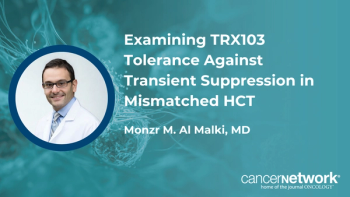
- ONCOLOGY Vol 21 No 11
- Volume 21
- Issue 11
Martin D. Abeloff, MD: Tributes and recollections
Martin D. Abeloff, MD: Tributes and recollections
We at the Cleveland Clinic patterned our cancer center on the model established by Marty Abeloff and his team, incorporating Hematology and Oncology into the administrative structure, and Marty was tremendously helpful in sharing insights into how he achieved that in a complex academic structure. His leadership in breast cancer research, the standards that he has set over the years, and his ability to integrate outstanding science and scientists with a top notch clinical cancer program are just a few of the lasting gifts that he has left with us.
Derek Raghavan, MD, PhD
Cleveland Clinic
Marty Abeloff was one of the strongest and most loved oncology leaders of our time. He shaped our thinking on research, policy, and care in so many ways. I don't think I ever made a decision on an important issue without first running it by Marty. He always had time for me and, I suspect, for everyone who yearned to benefit from his wisdom. His legacy will last for a long, long time.
Margaret Tempero, MD
UCSF Cancer Center
Marty Abeloff gave me and my colleagues sage and good-humored advice over the past 8 years as chair of the MSKCC Board of Scientific Counsellors. He knew how to criticize without insult, and how to praise without flattery. And he was wonderfully generous with his time. The world has lost one of its most outstanding physician-scientists, and his family and friends have lost a humane, politically engaged, and sensitive human being.
Harold Varmus
Memorial Sloan-Kettering
In his 15 years as director of the Kimmel Cancer Center, Dr. Martin Abeloff headed an outstanding institution, even as he continued to lead seminal research in breast cancer therapy and prevention. His contributions to the state of the science, in the use of mammography, and in techniques to screen for breast cancer risk factors, transformed prevention efforts. His death is one more reason we rededicate ourselves daily to the goals that Marty shared: trying to solve the mysteries of cancer so that future generations won't have to suffer unnecessarily.
Elias A. Zerhouni, MD, NIH
John E. Niederhuber, MD, NCI
Leadership of a department in an institution as complex as Johns Hopkins is a never-ending challenge and potentially ulcer-producing. Marty met the challenge and, as far as I know, managed to escape the ulcers. . . . Leadership that promotes and encourages growth of all who work in the department has been essential to the success of the past 30 years and will be the key to success in the coming decades.
David S. Ettinger, MD
Kimmel Cancer Center
Marty was one of the most decent and thoughtful leaders in our field. His death is a great loss, a real tragedy.
Steve Rosen, MD
Lurie Cancer Center
I am personally indebted to Marty Abeloff as he hired me and advanced my career, working as my mentor for my very first grant and my first clinical trial all the way through to helping me to become the occupant of the Breast Cancer Research Professor, an endowed chair for which he garnered the funds! So many of us at the Kimmel Cancer Center have enjoyed similar successes as Marty has served us individually and collectively through his leadership at the local, national, and international levels. Marty Abeloff reminds us that Leo Durocher was wrong-in fact, nice guys can finish first!
Nancy Davidson, MD
Kimmel Cancer Center
It is said that the great leaders don't create followers, they create more leaders. Marty spent the last 15 years making it possible for us to be leaders. The best way we can repay him is to emulate his example-giving all, taking little, and laying the foundation for the future.
Bert Vogelstein, MD
Kimmel Cancer Center
Articles in this issue
over 18 years ago
Remembering Martin D. Abeloff, MDover 18 years ago
New Lung Cancer Guidelines Oppose General CT Screeningover 18 years ago
FDA Approves Expanded Labeling for Alemtuzumabover 18 years ago
FDA Fast Tracks PI-88 to Treat Postresection Liver Cancerover 18 years ago
Common Early-Warning Symptoms of Ovarian Cancer IdentifiedNewsletter
Stay up to date on recent advances in the multidisciplinary approach to cancer.










































